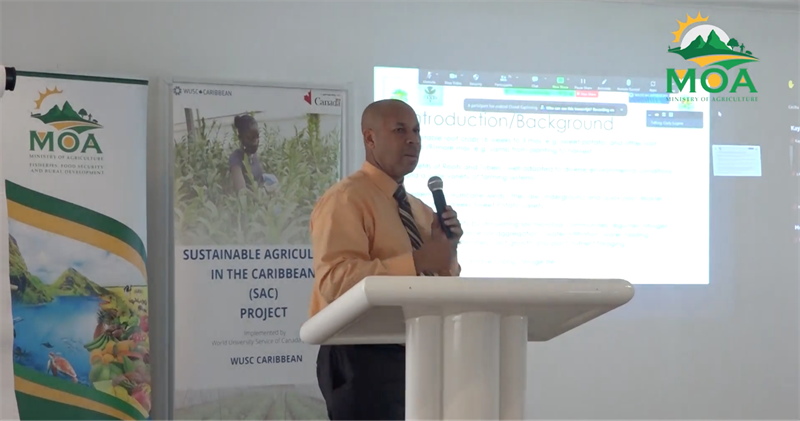ROOTS AND TUBERS CAN IMPROVE FOOD SECURITY AS THEY ARE ABLE TO WITHSTAND ADVERSE WEATHER CONDITIONS.
 The Ministry of Agriculture, Fisheries, Food Security, and Rural Development has collaborated with the World University Service of Canada (WUSC) Caribbean, the Saint Lucia Marketing Board and other sector stakeholders to host a Roots and Tubers Symposium. The symposium was held in observance of Business Month, under the tagline “Agriculture is my Business.”
The Ministry of Agriculture, Fisheries, Food Security, and Rural Development has collaborated with the World University Service of Canada (WUSC) Caribbean, the Saint Lucia Marketing Board and other sector stakeholders to host a Roots and Tubers Symposium. The symposium was held in observance of Business Month, under the tagline “Agriculture is my Business.”
The Roots and Tubers Symposium provided a platform that brought together key stakeholders at national and international levels to foster, stimulate and support the improvement of tropical root crop production and utilization.
Farmers in Saint Lucia, who have traditionally grown tropical root crops such as cassava, yams, dasheen, and sweet potatoes, were given the opportunity to engage in dialogue with representatives from the Ministry of Agriculture, WUSC Caribbean, the Saint Lucia Marketing Board, and other sector agencies, where they shared and compared knowledge on how they can contribute to the transformation of global agri-food systems.
Among sector challenges identified were the reduction in root crop production, land availability issues, as well as access to inputs.
Dean Avril, Climate Smart Agricultural Officer attached to the WUSC's Sustainable Agriculture in the Caribbean (SAC) Project, explains that root crops are an important part of the region's food supply. She said the purpose of discussions were to explore solutions to improve production and further enhance Saint Lucia’s food security.
The acting Deputy Director of Agriculture Services in the Ministry of Agriculture, Mr. Kemuel Jn. Baptiste, said root crops present a great opportunity for responding to climate change as they are able to withstand adverse weather conditions when well-established. Mr. Jn Baptiste stressed the importance of tropical roots and tuber crops in meeting global food security needs, improving staple foods, and creating new opportunities in Saint Lucia’s food supply.
The Ministry of Agriculture continues to implement CARICOM’s mandate to reduce food imports by 25 percent by the year 2025.